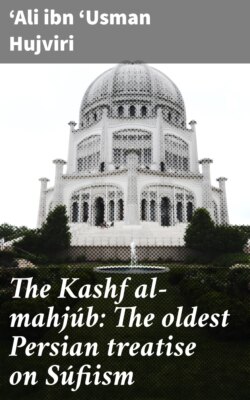Читать книгу The Kashf al-mahjúb: The oldest Persian treatise on Súfiism - 'Ali ibn 'Usman Hujviri - Страница 13
На сайте Литреса книга снята с продажи.
CHAPTER IX.
Concerning the People of the Veranda (Ahl-i Ṣuffa).
ОглавлениеTable of Contents
Know that all Moslems are agreed that the Apostle had a number of Companions, who abode in his Mosque and engaged in devotion, renouncing the world and refusing to seek a livelihood. God reproached the Apostle on their account and said: “Do not drive away those who call unto their Lord at morn and eve, desiring His face” (Kor. vi, 52). Their merits are proclaimed by the Book of God, and in many traditions of the Apostle which have come down to us. It is related by Ibn `Abbás that the Apostle passed by the People of the Veranda, and saw their poverty and their self-mortification and said: “Rejoice! for whoever of my community perseveres in the state in which ye are, and is satisfied with his condition, he shall be one of my comrades in Paradise.” Among the Ahl-i Ṣuffa[55] were Bilál b. Rabáḥ, Salmán al-Fárisí, Abú `Ubayda b. al-Jarráḥ, Abu ´l-Yaqẕán `Ammár b. Yásir, `Abdalláh b. Mas`úd al-Hudhalí, his brother `Utba b. Mas`úd, Miqdád b. al-Aswad, Khabbáb b. al-Aratt, Ṣuhayb b. Sinán, `Utba b. Ghazwán, Zayd b. al-Khaṭṭáb, brother of the Caliph `Umar; Abú Kabsha, the Apostle’s client; Abu ´l-Marthad Kinána b. al-Ḥusaynal-Ḥusayn al-`Adawí; Sálim, client of Hudhayfa al-Yamání; `Ukkásha b. Miḥṣan; Mas`úd b. Rabí` al-Fárisí; Abú Dharr Jundab b. Junáda al-Ghifárí; `Abdalláh b. `Umar; Ṣafwán b. Bayḍá; Abú Dardá `Uwaym b. `Ámír; Abú Lubába b. `Abd al-Mundhir; and `Abdalláh b. Badr al-Juhaní.
Shaykh Abú `Abd al-Raḥmán Muḥammad b. al-Ḥusayn al-Sulamí,[56] the traditionist (naqqál) of Ṣúfiism and transmitter of the sayings of the Ṣúfí Shaykhs, has written a separate history of the Ahl-i Ṣuffa, in which he has recorded their virtues and merits and names and “names of honour”. He has included among them Misṭaḥ b. Uthátha b. `Abbád, whom I dislike because he began the slanders about `Á´isha, the Mother of the Believers. Abú Hurayra, and Thawbán, and Mu`ádh b. al-Ḥárith, and Sá´ib b. Khallád, and Thábit b. Wadí`at, and Abú `Ísá `Uwaym b. Sá`ida, and Sálim b. `Umayr b. Thábit, and Abu ´l-Yasar Ka`b b. `Amr, and Wahb b. Ma`qal, and `Abdalláh b. Unays, and Ḥajjáj b. `Umar al-Aslamí belonged to the Ahl-i Ṣuffa. Now and then they had recourse to some means of livelihood (ta`alluq ba-sababí kardandí), but all of them were in one and the same degree (of dignity). Verily, the generation of the Companions was the best of all generations; and they were the best and most excellent of mankind, since God bestowed on them companionship with the Apostle and preserved their hearts from blemish.
55. I have corrected many of the following names, which are erroneously written in the Persian text, by reference to various Arabic works.
56. See Brockelmann, i, 200.
